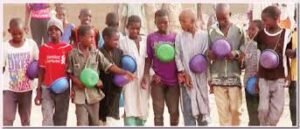Nigeria has the highest number of out-of-school children in the world. The country is facing a staggering crisis in its education sector, particularly in the northern region, where the number of out-of-school children has reached alarming levels with over 10.5 million children aged 5-14 not attending school. Juliet Jacob delves into the far-reaching implications of this crisis and explores potential solutions to the systemic barriers hindering education in Nigeria.
A Blow to the Future
The out-of-school children crisis in Nigeria is not just a blow to the future of millions of young Nigerians—it’s a threat to the entire nation’s economy and societal development. According to UNICEF, Nigeria accounts for 18.3 million out-of-school children in 2024, making it the global leader in this category. This crisis affects 15% of the world’s total out-of-school children, highlighting the severity of the issue and its wider economic and social implications.

Economic Implications of Out-of-School Children in Nigeria
The economic consequences of having such a significant portion of the population uneducated are dire. With 18.3 million children missing out on primary and secondary education, Nigeria faces a future workforce shortage in critical fields. As the global economy increasingly favours highly skilled labour, Nigeria risks falling further behind. Educated populations contribute to innovation, productivity, and economic stability, whereas an uneducated workforce limits the country’s ability to progress.
A report by the World Bank warns, “An educated workforce is a key driver of economic growth. In Nigeria, with one in three children out of school, economic development is severely hampered.” The lack of educational investment in children today translates to fewer opportunities for economic growth tomorrow.

Regional Breakdown: A North-South Divide
The regional disparity is striking. Approximately 66% of out-of-school children come from the Northeast and Northwest, where factors such as poverty, cultural beliefs, and insecurity are more pronounced. School attendance in these regions is alarmingly low; only 53% of children in the northern regions attend school, and net attendance rates for girls are even lower, with the Northeast and Northwest showing rates of 47.7% and 47.3%, respectively.
Such inequality in educational access creates significant regional divides, which could lead to further socioeconomic disparities. Communities in these regions may become even more isolated, as young people lacking basic literacy and numeracy skills struggle to find meaningful employment or contribute to local economies.
Factors Driving the Out-of-School Crisis
Nigeria’s out-of-school crisis stems from a mix of social, economic, and cultural factors, each reinforcing the others to create an environment in which education is deprioritized or inaccessible for millions.
Poverty Forces Nigerian Children Out of School and Into Work
Many Nigerian families are faced with an impossible choice: send their children to school or put food on the table.

For millions, the latter takes precedence, with children being forced into the workforce to supplement their family’s Meager income.
This stark reality is highlighted by UNICEF data, revealing that a staggering 65% of children engaged in child labour come from the poorest households. The link between poverty and lack of education couldn’t be clearer.
As a result, millions of Nigerian children are denied their right to education, perpetuating a cycle of poverty that’s difficult to break.
Without access to quality education, these children are robbed of the skills and knowledge necessary to secure better-paying jobs and improve their socio-economic prospects.
Experts warn that this trend has far-reaching consequences, not only for individual families but also for Nigeria’s economic growth and development.
Addressing the root causes of poverty and ensuring access to education for all is crucial to breaking this cycle and securing a brighter future for Nigeria’s next generation.
Insecurity Forces Schools to Shut Down

Militant groups and criminal gangs are wreaking havoc on Nigeria’s education sector, particularly in northern states, where attacks on schools have become alarmingly frequent.
The resulting climate of fear has led parents to withdraw their children from schools, fearing for their safety.
With schools vulnerable to assault, many parents are reluctant to risk their children’s lives, dealing a devastating blow to education in the region.
The situation is further exacerbated by school closures due to security concerns. This has denied thousands of children access to education, perpetuating a cycle of illiteracy and undermining Nigeria’s future.
Experts warn that the long-term consequences will be catastrophic, as an entire generation is deprived of the knowledge and skills necessary to drive economic growth and development.
Various stakeholders said that urgent action is needed to safeguard schools and ensure a secure learning environment, or risk losing a generation to the scourge of insecurity.
Cultural Norms and Gender Inequality Drive Alarming Dropout Rates
Nigeria’s educational landscape is marred by a disturbing reality: cultural norms and entrenched gender inequality are forcing girls out of school, perpetuating a cycle of illiteracy and limitation.
Reports reveal that over 50% of girls in basic education are not attending school, with child marriage, early pregnancy, and deep-seated traditional beliefs contributing to this alarming trend, particularly in rural and northern communities.
As a result, millions of girls are being denied their right to education, stifling their potential and undermining Nigeria’s efforts to achieve gender equality and economic development.
“Educating a girl child is not just about her future; it’s about the future of our communities,” noted the Nigerian Women’s Trust Foundation in a 2023 report. “Yet, in too many regions, the rights of girls are still not respected.”
Schools Grapple with Limited Infrastructure
Nigeria’s education sector is facing a crippling infrastructure crisis, leaving millions of children without access to quality learning environments.
Many schools lack basic facilities, such as classrooms, libraries, and sanitation facilities, while overcrowding has become the norm.
Teacher shortages are severe, with some schools operating with alarming pupil-to-teacher ratios.
This dire situation is particularly pronounced in rural areas, where children are often forced to learn in makeshift classrooms or under trees.
The consequences of this infrastructure deficit are far-reaching. Without access to well-equipped schools, Nigerian children are denied the education they need to compete in the job market.
This perpetuates cycles of poverty and limits the country’s economic growth potential.
Experts warn that urgent investment in education infrastructure is crucial to address these challenges and provide Nigeria’s youth with the skills and knowledge required to drive development and prosperity.
As the country’s population continues to grow, the need for quality education facilities has never been more pressing.
Poverty, Illiteracy, and Social Unrest
Nigeria’s failure to provide quality education to its children threatens to perpetuate a vicious cycle of poverty, illiteracy, and marginalization.
By keeping children out of school, the country risks condemning them to a life of unemployment or unskilled, low-paying jobs, making it impossible to break free from poverty.
This reinforces socioeconomic inequalities, creating a self-perpetuating cycle that hinders Nigeria’s development.
Experts warn that limited access to education also fuels social unrest, as disillusioned youth become vulnerable to recruitment by insurgent or criminal groups, exacerbating security issues.
“A well-educated youth population is essential for social stability. Without it, the foundations of society are weakened,” noted Dr. Aliyu Shehu, a sociologist at the University of Abuja.
The stakes are high, and Nigeria’s future hangs in the balance. As the country struggles to address its education crisis, Dr Shehu said policymakers must prioritize investment in quality education, addressing the root causes of poverty and inequality.
The academic added that by doing so, Nigeria can unlock the potential of its youth, promoting social stability, economic growth, and a brighter future for generations to come.
A Call to Action for a Brighter Future
Education stakeholders said Nigeria should set an ambitious goal to reduce its out-of-school population to 17% for primary school age and 26% for upper secondary school age by 2030.
To achieve this, the government, in partnership with local and international organizations, must take a multi-faceted approach to tackle poverty, address security concerns, improve infrastructure, and promote inclusive education for all children.
Government Must Fund Education
Increasing funding for education is crucial, with more funds allocated to building and maintaining schools, providing learning materials, and training teachers, especially in underserved areas.
This investment will pay dividends in the long run, as education is key to unlocking Nigeria’s economic potential.
Improved Security Measures
Implementing security measures for schools, particularly in conflict-prone regions, is also essential to ensure parents feel safe sending their children to school.
Community-based security initiatives and partnerships with local law enforcement can help create a safer learning environment.
Inclusive Education
Promoting inclusive education policies is another vital step. Campaigns should focus on changing cultural norms that discourage education, particularly for girls.
Government programs aimed at raising awareness and providing financial incentives can encourage more families to keep their children, especially daughters, in school.
Organizations like UNICEF and private firms can also play a key role in bridging funding gaps, offering scholarships, and providing alternative education options for children who cannot attend regular schools.
Partnership With NGOs
Effective partnerships with NGOs and the private sector are already yielding results.
For example, the Global Partnership for Education has supported integrated religious schools and trained teachers in five states to ensure more children attend and stay in school, particularly girls.
Similarly, local NGOs like United for Education, Whitefield Foundation, and New Era Educational and Charitable Support Foundation are working tirelessly to improve education outcomes.
With sustained commitment and collaboration, Nigeria can overcome its education challenges and unlock a brighter future for its youth.
Conclusion
The out-of-school children crisis in Nigeria is a complex issue that affects the country’s economy, social stability, and future prosperity. Addressing this issue requires immediate, coordinated action from all sectors of society. Without urgent intervention, Nigeria risks not only limiting the potential of an entire generation but also destabilizing its future.



